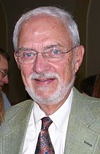|
By Wally Pregnall
College of Health Professions
When Glen Askins, M.D.,
passed away on May 2, the obituaries that followed were appropriately
extensive, noting the many achievements and honors of a lifetime
spanning 76 years.
For the MUSC community and
beyond, it is the qualities known to those closest to Askins, College
of Health Professions professor and clinical services department chair,
that make his legacy and his loss all the more profound.
Colleagues repeat certain words to describe Askins: thoughtful,
insightful, steady, low-key, unflappable, caring, empathetic, humble,
endearing and intellectually curious are among the most common.
 Dr. Glen Askins: Founder and later senior medical advisor of the
Physician Assistant (PA) Program at MUSC; Chair of College of Health
Professions Department of Clinical Services. Served on the Marion
County school board ; Member and chairman of the S.C. Commission of
Higher Education, Committee on Health and Medical Education, and
Committee on Planning Assessment. Distinguished Service Award, American
Heart Association; Marion Citizen of the Year; Health Sciences
Foundation "Clinician of the Year" Award. Dr. Glen Askins: Founder and later senior medical advisor of the
Physician Assistant (PA) Program at MUSC; Chair of College of Health
Professions Department of Clinical Services. Served on the Marion
County school board ; Member and chairman of the S.C. Commission of
Higher Education, Committee on Health and Medical Education, and
Committee on Planning Assessment. Distinguished Service Award, American
Heart Association; Marion Citizen of the Year; Health Sciences
Foundation "Clinician of the Year" Award.
Friend and colleague
Layton McCurdy, M.D., dean emeritus of the College of Medicine,
describes him as "wonderfully complex." Students sensed his interest in
their lives and careers was real. Colleagues knew that his love of
knowledge and the practice of his profession were authentic. Patients
in his care recognized that they were respected, listened to and
understood.
Not one to hesitate
expressing what he thought, Askins was often direct, a quality
sometimes misunderstood until it was evident that his motivation was
simply the desire for the best for the patients, students, colleagues
and institutions he served. As Arnie Metz, assistant professor in the
Physician Assistant Program recalled, "At first, when we were trying to
get the PA Program off the ground, I thought of him as a gruff, smoking
doctor. As our relationship developed, we both opened up and I saw the
kind, thoughtful man behind the deep Southern drawl."
Ben Clyburn, M.D.,
associate dean for Graduate Medical Education Faculty Development,
noted that Askins had no problem pointing out areas in which a student
had a weakness and needed additional work, yet he was universally loved
and respected by his students because his concern for them was
transparent.
Askins' qualities were
appreciated by his colleagues as well. Jerry Kurent, M.D., said Askins
served as an outstanding role model for his students and residents. "I
already was well established in my own career when I came to know Glen
Askins as a kind, empathic, and skilled clinician, outstanding
educator, and tireless administrator, who possessed a great sense of
humor and was fun to be around," said Kurent.
Reamer Bushardt, PharmD,
former director of the PA Program and current chair of the Wake Forest
University Department of Physician Assistant Studies, appreciates that
Askins passed on his gifts. "I don't think anyone ever challenged me
the way he did," said Bushardt. "He thought more than he talked, and he
always listened." Shortly after informing Askins of his difficult
decision to leave MUSC for Wake Forest, Bushardt remembers a note he
got from Askins. "I received an envelope in the mail from him a few
days later, and there was a little note inside which in his handwriting
read 'management is doing things right, leadership is doing the right
thing.' He taught me to always choose leadership." The note now hangs
above Bushardt's desk, just as it did in Askins' office.
The qualities which
endeared Askins to colleagues, students and patients transcended formal
relationships and resulted in deep, lasting friendships. As Metz
states, "We spent many a day traveling through small-town South
Carolina meeting with his innumerable contacts trying to establish
clinical training sites for our students. We talked about everything
from God to baseball to fishing and hunting."
As they and their wives
became friends, they often enjoyed traveling to Florida for spring
training baseball games, fall color excursions in Maine and fishing.
Clyburn, almost 30 years
Askins' junior, marvels at how easily Askins bridged the generational
gap, as they often traveled together to football games or entertained
at one another's homes. Kurent recalled the laughs as they traded
stories about their fishing excursions. All who knew Askins know he
derived his greatest pleasure from his interaction with students, his
treasured friends, and above all, his beloved family, he said.
For innumerable reasons,
both personal and professional, Askins will be missed by the MUSC
community. His legacy will live on not only through his achievements
and the many students he sent forth to practice, but through the manner
in which he lived life.
"I'm especially going to
miss the quiet talks we had about everything and nothing," said Metz—a
sentiment undoubtedly shared by many.
In his closing remarks at
Askins' funeral, McCurdy quoted Robert Louis Stevenson. "That man is a
success who has lived well, laughed often and loved much; who has
filled his niche and accomplished his task; who looks for the best in
others and gives the best that he has; who leaves the world better than
he found it." McCurdy concluded, "Glen Askins was such a man."
|



 Dr. Glen Askins
Dr. Glen Askins